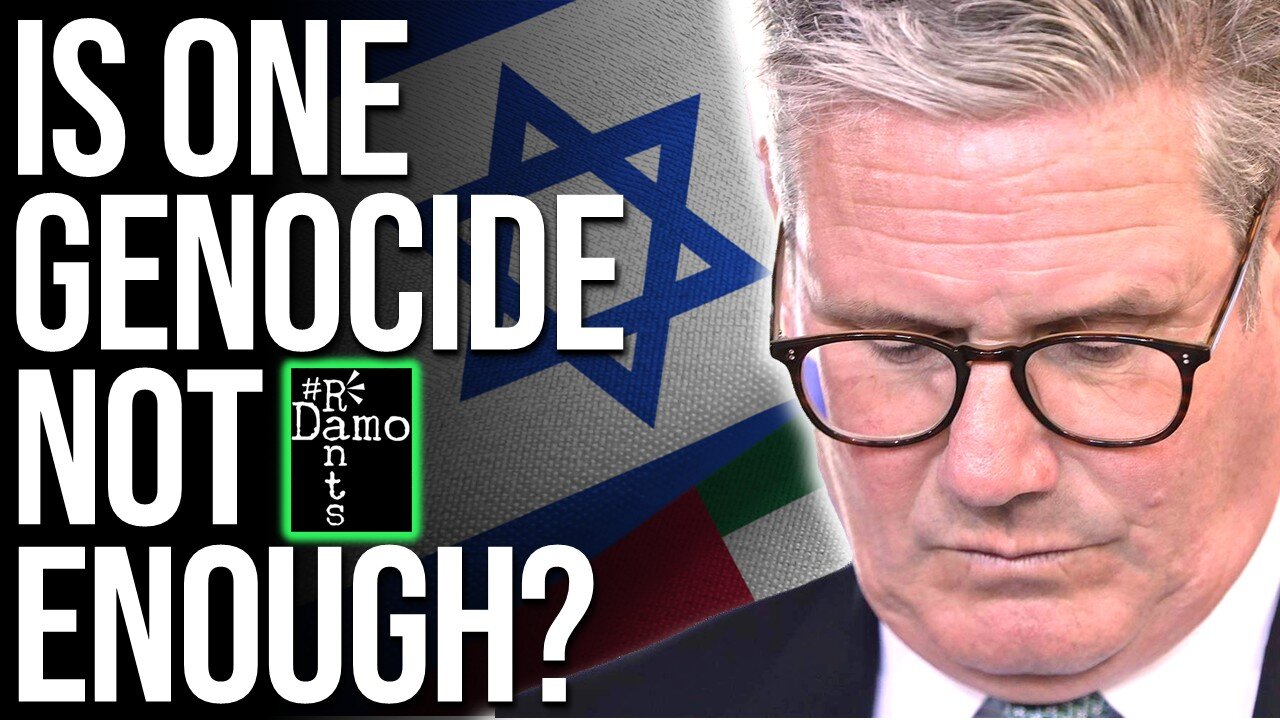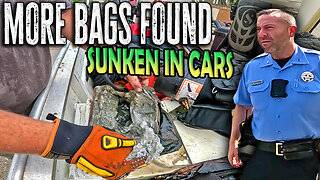Premium Only Content

Britain Caught Arming Another Genocide — And the Proof Just Dropped
Right, so we’re told that Britain supposedly has the world’s most “rigorous” arms controls. Perhaps it would be better to regard them as rigorously ignored instead. UN investigators have now traced British-made weapons straight into the hands of Sudan’s Rapid Support Forces — the same militia accused of genocide in Darfur and elsewhere. The supplier? Britain’s “strategic partner” the UAE, a state that bankrolls these mercenaries, builds illegal bases, and enjoys ongoing normalised relations with Israel while Gaza starves and comes under renewed atrocity during a ceasefire where Israel never ceased firing.
On top of that, Israel is benefitting from the genocide in Sudan as it has provided an alternative route for goods avoiding the Red Sea and potential Houthis strikes. So what we have here is a cycle of genocide, where the UK arms the UAE, who appear to be handing said munitions to the RSF, which in turn is facilitating goods headed to Israel.
It seems for the UK, complicity in one genocide just isn’t enough.
Right, so Sudan today is the world’s largest internal displacement crisis. UN OCHA’s figures show almost nine million people uprooted, most from Darfur. Human Rights Watch has documented RSF-aligned forces conducting killings, sexual violence and village clearances that match the legal pattern of crimes against humanity. This is the context in which British-made systems have been recovered. These are the realities of a documented atrocity. The government cannot claim ignorance. It can only claim that other interests mattered more.
Those interests run through the Gulf. The UAE is one of Britain’s top arms customers. It is also Israel’s partner under the Abraham Accords. Satellite imagery just published has also shown Emirati engineers constructing a new airstrip and military installations on Zuqar Island, the Yemeni island that sits just north of the Bab al-Mandab Strait. That base, together with the long-standing Emirati facility at Assab in Eritrea and the six-billion-dollar port project on Sudan’s coast, forms a chain of military-commercial outposts running up the Red Sea. It is marketed as stability. It operates as leverage. Whoever holds those ports and islands dictates the flow of energy and trade between Asia, Africa and Europe. When Britain sells the hardware that makes that control possible, it isn’t exporting security; it’s renting out impunity. The history of the RSF ties these threads together. During the Saudi-UAE led intervention in Yemen against the Ansarallah movement, the Houthis, thousands of Sudanese fighters were deployed as coalition auxiliaries. Reporting at the time described monthly payments through Emirati banks and the use of RSF units in ground operations against Ansarallah. That campaign ended without victory, nobody can seemingly beat the Houthis, but it created a battle-hardened Sudanese force financed and equipped by Abu Dhabi. When Sudan’s power struggle kicked off after 2021, those fighters returned home with that experience and their UAE patronage still in place. The militia now accused of genocide in Sudan is the very same formation the UAE once paid to fight the Houthis. The equipment they use and the routes that supply them are part of the same ecosystem. The product is a mercenary network trained in one war and unleashed in another.
After the events of October 7th, the Houthis of course began attacking Israel-linked shipping in the Red Sea and we know how effective they were at that: carriers suspended transits, insurers hiked rates, and trade to Eilat collapsed, the port there has gone bust. It was widely reported after that that shipping was rerouted around the Cape of Good Hope, up to the Mediterranean. But another route has appeared. Port Sudan, although in the Red Sea, has not been seen to be a supplier to Israel, it’s on the wrong coast after all and goods headed there, the Houthis haven’t bothered with. Right, now, with a ceasefire supposedly in place, they’ve suspended their actions just as they have before, Yet Port Sudan has become a transit point for goods, which are allowed passage by the RSF, presumably at the behest of their paymasters the UAE, allied to Israel as they are, all re-manifested through Egyptian terminals into the Mediterranean, so Sisi seems to be in on this as well.
In this rerouted economy therefore, the UAE’s logistics and capital have provided a shortcut that is keeping Israeli-related trade moving via the Red Sea despite the threat posed by the Houthis. The same state accused of arming Sudan’s RSF is thus helping sustain Israel’s supply lines during a war under ICJ scrutiny for plausible genocide. The circuit therefore completes itself and of course we come to Britain’s role in all of this. British weapons feed Emirati capacity; Emirati capacity arms Sudan’s killers and stabilises Israel’s commerce at the same time. What the Houthis closed in defence of Gaza, Britain and its Gulf partner have found a way of circumventing.
So the UK writes export criteria that ban licences where there is a clear risk of serious violations of international humanitarian law or diversion to an embargoed conflict. The 2019 Court of Appeal ruling on Saudi Arabia and Yemen established what that means: if the risk is clear, the licences stop. The matter of Israel and Gaza has shown that doesn’t prove to be the case. The UN briefings on Sudan, the Amnesty warnings, and the Guardian’s investigation of recovered British kit there now, make that risk undeniable. Continuing approvals is not a technical lapse as we should all know by now; it is a political choice. The government did not fail to notice; it simply decided to carry on.
The official defence remains the same. Ministers recite that exports are “assessed case-by-case” and that Britain has “one of the world’s most rigorous regimes.” They omit the material fact that the same regime was already caught out once by the courts for licensing arms to a coalition committing war crimes in Yemen. They rely on the public not connecting the dots. But the pattern is consistent: a Gulf partner accused of enabling atrocities, warnings received, licences renewed, and no minister resigning. The language tells you everything if you listen for it. “Engagement” means dependency. “Strategic relationship” means immunity.
Britain calls for adherence to the rules-based order while fuelling the states breaking those rules. It invokes human rights in speeches and sells engines for armoured carriers found on battlefields where civilians were burned out of their homes. It demands accountability from adversaries and offers discretion to clients. That contradiction is not a glitch; it is the governing principle of British foreign policy. The state that lectures others on restraint has just been caught enabling the very crimes it claims to stop.
The logistical map makes the connection physical. Reuters has tracked the surge in Red Sea freight costs and diversions since 2024. Egypt’s terminals report increased throughput. So these are not hidden links; they are open data points.
The British components found in Sudan are part of the same supply ecosystem that keeps those Red Sea routes alive. It’s one network — arms, cargo, ports, and excuses — all feeding each other. Those British engines aren’t just sitting in armoured cars in Khartoum; they’re keeping the UAE’s regional war machine humming from Zuqar Island down to Assab and across to Port Sudan. That same machine is what keeps Israel’s trade flowing while Gaza starves. Different wars, same logistics. Britain signs the licences, the UAE moves the kit, Israel benefits from the cover, and ordinary people in Darfur and Gaza pay the price.
When Whitehall rubber-stamps another export licence to the Emirates, it isn’t supporting stability. It’s underwriting a supply chain that links a genocide in Sudan to a siege in Gaza. The government calls it a “strategic relationship.” What it means is: we’ll pretend not to see what you’re doing, as long as the cheques clear and the press doesn’t ask the wrong questions.
Ministers talk about stability, partnership, mutual trust. What they’re buying is deniability. Everyone already knows where this gear turns up. The UN’s documented it. Amnesty’s shown it. Reuters has traced the serial numbers. The Guardian has printed the story. But Downing Street keeps the tap open. Because if they ever admit that British weapons are being used by the RSF, the whole export-control lie falls apart. The paperwork isn’t protection; it’s camouflage.
This is not diplomacy. It’s a laundering operation for war crimes with polite language wrapped around it. The UAE builds airstrips on Yemeni islands it doesn’t own, fuels a genocidal militia in Sudan, and still gets state-visit treatment in London. Israel flattens Gaza under an ICJ order to prevent genocide, and Britain protects its back-door supply lines through the same ports. That isn’t coincidence; that’s policy in practice. It’s the West outsourcing dirty work to clients, then congratulating itself for keeping its hands clean.
The plain truth is this: British weapons travelled farther than British law was willing to follow. The export criteria say the licences stop when there’s a clear risk of serious violations of humanitarian law. That threshold was crossed long ago. The government knew it. They carried on anyway. Because legality can be managed and morality doesn’t pay. The state didn’t blunder into this; it walked straight through the warning signs.
And now Britain’s inside the circle. Arms to the UAE feed the RSF’s massacres in Darfur. The same UAE keeps Israel’s war economy alive by running trade through Sudanese and Egyptian ports while the Houthi actions in the Red Sea remains a concern, despite it being suspended right now – inference being, Israel is going to start again in my mind, not that many people I don’t imagine think differently. London’s fingerprints are on every link of that chain though, intentional or not. The public line is that we’re promoting stability. The real line is that we’ve become part of a system where genocide is just a cost of doing business.
Look at the pattern. Sudan’s coast turned into a cargo lifeline. Egypt profits off trans-shipment. The UAE builds bases and runs ports. Israel keeps trading. Britain provides the hardware and the legal cover. Nobody breaks rank, because everyone’s making something out of it. This is what “global Britain” actually means: a weapons subcontractor with diplomatic immunity.
The law is crystal clear though, which means there’s questions to answer. The Arms Trade Treaty and the UK’s own export rules say licences must be halted when diversion or violations are likely. The 2019 Court of Appeal already told the government what that means — you can’t take an ally’s word for it when evidence says otherwise. But when the ally is the Emirates, the rules turn to suggestions. The Foreign Office might call it pragmatism or some other platitude, but anyone outside Westminster can see it for what it is: selective blindness dressed up as following the rules.
The calculation is brutally simple. Lose a few billion in defence exports and anger a Gulf investor bloc, or risk being called complicit in genocide? The government knows which option costs more votes. The oil money, the property deals, the arms factories — that’s the real special relationship. Sovereignty gets sold off one export licence at a time.
This is how empires die — not in dramatic speeches, but in routine paperwork. Britain once claimed to police the world. Now it issues export licences to whoever actually does the policing. The rhetoric hasn’t changed, only the direction of the guns. The Foreign Office still talks about human rights while its own weapons show up in killing zones – a second scene of genocide as that is now. The gap between what Britain says and what Britain does is now a chasm you can see from space.
The cost is counted in people, not numbers. The UN says nearly nine million Sudanese have been forced from their homes. Twenty-four million need aid. Darfur’s villages are disappearing. In Gaza, the ICJ says the risk of genocide is plausible and has been established as such. And still Britain backs the same network of partners arming both genocides. The humanitarian language is just cover for the logistics of control.
This isn’t about mistakes. It’s about choices. Choices made in full knowledge of where the weapons go and what they’re used for. Choices that trade legal risk for political convenience. Every minister who signs off another licence to the UAE does it knowing that the material can and will end up with forces committing atrocities, so will it continue? They do it because stopping would mean confronting the reality that Britain’s moral authority is already gone.
If Britain had any intention of applying its own rules, it would suspend the UAE licences today. It would demand an end to Emirati re-exports, shut down the base on Zuqar built on stolen Yemeni soil, and make its support for Israel conditional on compliance with the ICJ order. It will not, because doing so would expose the depth of this alliance of convenience. The words “rules-based order” would have to be retired permanently.
So the circle stays unbroken. British industry builds, the Gulf buys, the weapons move, civilians die, and another press release calls it partnership. The paperwork keeps the whole thing respectable until someone breaks the story. The reality is a transnational protection racket where London is the armourer and the apologist all in one.
And if nothing changes, this won’t stop in Sudan. The next war will be armed the same way, justified the same way, and forgotten the same way. The faces of the victims will change; the excuses will not. Britain will keep preaching restraint while exporting impunity. That’s not foreign policy — it’s a confession with a flag shoved up its arse.
The evidence is public, the law is written, the decisions are traceable. The only question left is whether Britain still thinks it can get away with pretending it doesn’t know.
And of course it isn’t just in arms exports this has been exposed in, but in how Britain opposes those who call it out. Palestine Action regarded as a terror group for throwing paint on some planes, but the Al-Qaeda cast-offs now running Syria, who have killed 11,000 people since seizing power last December – well they just got delisted as a terror group. Square that hole if you can! Get all the details of that story in this video recommendation here as your suggested next watch.
Please do also hit like, share and subscribe if you haven’t done so already so as to ensure you don’t miss out on all new daily content as well as spreading the word and helping to support the channel at the same time which is very much appreciated, holding power to account for ordinary working class people and I will hopefully catch you on the next vid. Cheers folks.
-
 LIVE
LIVE
Mally_Mouse
34 minutes ago🌶️ 🥵Spicy BITE Saturday!! 🥵🌶️- Let's Play: Minecraft Christmas Adventure!!
7,105 watching -
 26:09
26:09
Exploring With Nug
10 hours ago13 Cold Cases in New Orleans What We Discovered Beneath the Surface!
3373 -
 27:39
27:39
MYLUNCHBREAK CHANNEL PAGE
5 hours agoDestroying Time.
82.1K5 -
 LIVE
LIVE
SavageJayGatsby
30 minutes ago🔥🌶️ Spicy Saturday – BITE Edition! 🌶️🔥
42 watching -
 2:14:31
2:14:31
Side Scrollers Podcast
5 hours agoSide Scrollers INVITE ONLY - Live From Dreamhack
124K7 -
 1:18:23
1:18:23
Simply Bitcoin
2 days ago $11.83 earnedThe Bitcoin Crucible w/ Alex Stanczyk and Lawrence Lepard
16.6K4 -
 1:25:03
1:25:03
Jeff Ahern
5 hours ago $16.99 earnedThe Saturday Show with Jeff Ahern
66.8K8 -
 1:31:56
1:31:56
Michael Franzese
20 hours agoWill NBA do anything about their Gambling Problems?
127K26 -
 57:26
57:26
X22 Report
9 hours agoMr & Mrs X - The Food Industry Is Trying To Pull A Fast One On RFK Jr (MAHA), This Will Fail - EP 14
99.5K66 -
 2:01:08
2:01:08
LFA TV
1 day agoTHE RUMBLE RUNDOWN LIVE @9AM EST
157K14